Calvin Institute of Christian Worship Liturgical Studies (10 vols.)
Digital Logos Edition
How we worship is a topic of endless debate, discussion, and sometimes even division, within our churches today. This series is designed to promote reflection on the history, theology, and practice of Christian worship and to stimulate worship renewal in Christian congregations. Written by pastoral worship leaders from diverse communities and scholars from a range of disciplines, these volumes seek to nurture worship practices that are at once spiritually vital and theologically rooted.
The Calvin Institute of Christian Worship Liturgical Studies series offers resource guides, essays, and helpful reflections on ways to engage this subject and benefit your congregation. Learn how to use and pray the Psalms in your services, explore the role of visual art in worship, and examine the relationship of theology and worship. In these volumes, you’ll discover historical context and practical contemporary wisdom that will guide you through decisions regarding worship in your community.

- Offers practical guidance on various issues relating to worship
- Provides historical context
- Examines the roles of art, music, and language in worship
Individual Titles
- The Biblical Psalms in Christian Worship: A Brief Introduction and Guide to Resources by John D. Witvliet
- Primer on Christian Worship: Where We’ve Been, Where We Are, Where We Can Go by William Dyrness
- Handel’s Messiah: Comfort for God’s People by Calvin R. Stapert
- The Substance of Things Seen: Art, Faith, and the Christian Community by Robin M. Jensen
- A New Song for an Old World: Musical Thought in the Early Church by Calvin R. Stapert
- Discerning the Spirits: A Guide to Thinking about Christian Worship Today by Cornelius Plantinga Jr.
- A More Profound Alleluia: Theology and Worship in Harmony by Leanne Van Dyk
- Christian Worship in Reformed Churches Past and Present by Lukas Vischer
- Inclusive yet Discerning: Navigating Worship Artfully by Frank Burch Brown
- What Language Shall I Borrow? The Bible and Christian Worship by Ronald P. Byars
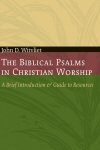
In this concise yet comprehensive guide to using and praying the Psalms in worship services, John Witvliet first offers summary of key biblical-theological themes related to the practice of worship, then continues with reflections on every step in the process of preparing to use the Psalms in worship, drawing on insights from writings in the history, theology, and pastoral practice of worship, liturgy, and preaching. Including patristic testimonies as “prelude” and both Reformation-era and modern testimonies as two “interludes,” the volume also offers a comprehensive list of currently available liturgical and musical resources.
Witvliet offers a first—a book designed to speak at once to both “traditional” and “contemporary” worship practices. The Biblical Psalms in Christian Worship will appeal to a wide range of readers, including college and seminary students, scholars and teachers, church educators, worship leaders, musicians, and librarians.
In a climate of theological specialization and isolation, Witvliet offers an excellent integrative resource that invites joint learning and prayer.
—Theology Today
I would recommend this book highly to parish personnel, from priest to musicians to lectors to liturgy planners. It’s clear, well written, and well informed. This book is a true service to the whole Church, Catholic, Orthodox, and Protestant.
—Parish Liturgy
The Psalms are the canonical hymnbook of both synagogue and church, but in much contemporary worship they find little place. John Witvliet gives a robust defense of their spirituality and theological inspiration, and provides sound pastoral advice and useful resources to enable ministers and worship planners to place them at the center of authentic biblical worship.
——Bryan D. Spinks, Bishop F. Percy Goddard Professor of Liturgical Studies and Pastoral Theology, Yale Institute of Sacred Music and Yale Divinity School
Worshiping communities that accept John Witvliet’s invitation to read, sing, pray, study, and share the Psalms more deliberately will find themselves on a path to deep formation in biblical faith . . . The rich array of helpful resources gathered here will equip worshiping communities to walk that path with attentiveness, creativity, and gratitude. An inspiring and informative book, especially for those who are called to lead congregations into the treasures of the Psalter as pastors, worship leaders, musicians, and educators.
—Dorothy C. Bass, professor of theology, Valparaiso University
Practical theology of the highest order. Witvliet’s work is deeply grounded in good critical study and in the teaching of the church tradition. But his eye is on the congregation where the Psalms take on new life in each fresh rendering, and he stands alongside other practitioners of prayer and praise who move back and forth between text and context. His book is an immensely rich resource for such practice.
—Walter Brueggemann, William Marcellus McPheeters Professor of Old Testament, emeritus, Columbia Theological Seminary
John D. Witvliet is director of the Calvin Institute of Christian Worship and teaches theology, worship, music, and congregational studies at Calvin College and Calvin Theological Seminary. He is the author of Worship Seeking Understanding: Windows into Christian Practice.
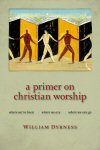
A respected scholar of theology and culture, William Dyrness explores where the church has been, theologically and historically speaking, and how that shapes—and needs to shape—where the church will go. He shows how both medieval worship and Reformation spirituality have continued to determine the development of Christian worship in both its Catholic and its Protestant forms.
Through accessible language, clear examples, and thoughtful questions for reflection and discussion, Dyrness makes a very vital conversation about worship available to a wide audience of pastors, worship leaders, and church members.
A Primer on Christian Worship explores the history and current state of worship with clarity and humility. William Dyrness does not resort to soapboxes but shows careful discernment. As the chapters unfold, one is invited to rethink what we do when we ‘tell the story of God’s love’ each time we gather. At once foundational and practical and visionary, this book will be superb for worship committees that want to think about worship theologically and historically — and want to learn how various styles of worship shape our faith. Those who come to this book with an open mind and heart will finish it knowing they have encountered wisdom.
—C. Michael Hawn, author, Gather into One: Praying and Singing Globally
It is all too rare to find a book that is as practical and useful for the real challenges of congregational worship as it is theologically insightful and richly rooted in church history. The historical theology of Bill Dyrness’ Primer on Christian Worship leads clearly to the actual practice of worship without limiting worship by ‘style’ or other superficial concerns that beset so many congregations. Dyrness’ thoughtful, engaging book is enhanced by his clear and warm writing style, the questions for discussion at the end of every chapter, and its well-focused breadth as a useful introduction to the history, shape, and practice of Christian worship.
—Robbie F. Castleman, author, Parenting in the Pew
In this small book Dyress seeks to make accessible to evangelical free-church Protestant pastors, worship leaders, and laity some of the contemporary ecumenical conversation about liturgy. He largely succeeds at this goal through an accessible style and through the suggested supplementary readings and discussion questions he provides at the end of each chapter.
—Worship
William A. Dyrness is professor of theology and culture at Fuller Theological Seminary. His books include Reformed Theology and Visual Culture, Senses of the Soul, and A Primer on Christian Worship.
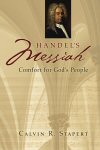
If you want to enjoy and appreciate Handel’s beloved Messiah more deeply, this informed yet accessible guide is the book to read.
Here you will find fascinating historical background to Messiah, including its unlikely inception, and learn about its reception and impact from Handel’s day to our own. Calvin Stapert devotes most of his book to scene-by-scene musical and theological commentary on the entire score, demonstrating how the music of Messiah beautifully intertwines with and illuminates its biblical text. Through these pages Handel’s popular and much-loved masterpiece will be greatly enhanced for listeners old and new alike.
A superb study of one of the most widely performed pieces of Western music. As we have come to expect from this author, the writing is profound and scholarly as well as lucid and accessible. This is destined to be a classic guide to a classic work.
—Jeremy Begbie, Thomas A. Langford Research Professor of Theology, Duke University
Calvin Stapert observes that oratorio, like opera, was written to entertain. Messiah certainly does that. But it does more. It proclaims good news. This fascinating, informative book will enrich the hearing of one of the world’s musical masterpieces. It will also deepen and enhance appreciation of one of Christianity’s true treasures.
—John Buchanan, former pastor, Fourth Presbyterian Church of Chicago
Although Handel’s Messiah is known and loved by many, the composer’s intentions and purpose in creating this unique work are either unknown or underappreciated . . . In this book Calvin Stapert’s aim is not merely to give his readers information about this remarkable oratorio; he wants them to understand it—an aim admirably achieved with clarity, conviction, and charm.
—Robin A. Leaver, visiting professor, Yale Institute of Sacred Music, Queen’s University Belfast
Messiah is ‘the classic,’ not only in the West but even in Japan. I have been performing this magnificent work with Bach Collegium Japan every year in the past decade, but it still makes us exuberant each and every time we perform it. When it comes to Bach cantatas, we oftentimes cannot help but be earnest and vigilant performing them, but in Messiah we can pour our hearts out as we please! According to Reformer John Calvin, music can deliver words deeply into our hearts, as through a funnel wine is poured into a vessel. Messiah must be one of the best funnels distilling God’s words to the depths of our hearts. In this book my friend Calvin Stapert helps us understand this masterwork from manifold points of view, pouring deeper appreciation for the work into our hearts through the funnel of his words. Thank you very much, Cal!
—Masaaki Suzuki, founder and director, Bach Collegium Japan
A superb general treatment of a cornerstone in Western cultural history, Stapert’s book is a work of great intelligence and devotional warmth. Highly recommended.
—Stephen A. Crist, associate professor, Emory University
Calvin R. Stapert is professor emeritus of music at Calvin College in Grand Rapids, Michigan. His previous books include My Only Comfort: Death, Deliverance, and Discipleship in the Music of Bach; Handel’s Messiah: Comfort for God’s People; and A New Song for an Old World: Musical Thought in the Early Church.
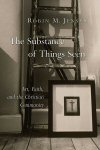
While the average person rarely sees it, the visual arts play a subtle yet profound role in the teaching and formation of faith, both for individuals and religious communities. The Substance of Things Seen explores the intersection of art and faith, offering thoughtful reflections on the way art functions in Christian life and practice.
Highly readable and featuring instructive illustrations, this book is meant to engage church leaders as well as artists in constructive conversation about the critical role that art can play in the renewal of Christian education, worship, and study. It also challenges anyone who thinks the arts are only of marginal importance to the religious life. Robin Jensen considers here a broad range of topics relevant to Christian faith and culture, including the construction of sacred space, the use of art in worship and spiritual formation, the way that visual art interprets sacred texts, and the power and danger of art from a historical and contemporary perspective.
No one has done a better job of explaining the first three centuries of Christian images within their cultural context: the persecutions, the doctrinal disputes, and the great intellectual ferment.
—Touchstone
Any church group or arts committee discussing visual arts and their role in the faith life of the church would benefit from this practical and insightful book.
—Reformed Worship
Robin Jensen’s book makes a wonderful contribution to the thoughtful conversation about art in the church. Though historically and theologically informed, the book is accessible to a wide range of audiences, and it will be useful for church study groups and college and seminary classrooms. Jensen addresses some of the most critical—and controversial—issues with wisdom and insight.
—William A. Dyrness, author, Primer on Christian Worship
Robin M. Jensen is Luce Chancellor’s professor of the history of Christian art and worship at Vanderbilt Divinity School in Nashville, Tennessee. She is also the author of Understanding Early Christian Art.
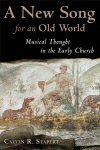
Even as worship wars in the church and music controversies in society at large continue to rage, many people do not realize that conflict over music goes back to the earliest Christians as they sought to live out the “new song” of their faith. In A New Song for an Old World Calvin Stapert challenges contemporary Christians to learn from the wisdom of the early church in the area of music.
Stapert draws parallels between the pagan cultures of the early Christian era and our own multicultural realities, enabling readers to comprehend the musical ideas of early Christian thinkers, from Clement and Tertullian to John Chrysostom and Augustine. Stapert’s expert treatment of the attitudes of the early church toward psalms and hymns on the one hand, and pagan music on the other, is ideal for scholars of early Christianity, church musicians, and all Christians seeking an ancient yet relevant perspective on music in their worship and lives today.
A fresh, useful study that draws together several disparate streams of traditional thought and finds golden nuggets buried in unlikely places. Writing from a perspective that wisely celebrates Christian artistic emancipation from Enlightenment domination, Stapert sensitively explores early-church views on the relationship between music as redeemed gift and music as fallen hindrance—music as spiritually substantive rather than merely personally preferential. This is essential reading not only for those involved in worship arts but also for Christians active in all areas of musical life who seek a more balanced perspective on the relationship between the spiritual and the aesthetic.
—Mark Hijleh, president, Christian Fellowship of Art Music Composers
Calvin R. Stapert is professor emeritus of music at Calvin College in Grand Rapids, Michigan. His previous books include My Only Comfort: Death, Deliverance, and Discipleship in the Music of Bach; Handel’s Messiah: Comfort for God’s People; and A New Song for an Old World: Musical Thought in the Early Church.

Christian worship in North America has undergone great change in recent years. But change always brings uncertainty—at times even division—about what constitutes “authentic worship.” This important book reviews a wide variety of current perspectives and offers a fresh outlook on the contemporary practice of Christian worship.
In order to provide the widest, most insightful discussion on present-day worship practices yet assembled, the authors gathered a team of church musicians, ministers, worship leaders, and educators from eight church traditions. Discerning the Spirits is the fruit of their work. Shaped by the wisdom of men and women like Marva Dawn, Justo Gonzalez, C. Michael Hawn, and John Witvliet, this book broadens today’s “worship wars” into a bigger, richer discussion that moves from arguments over musical tastes to good thinking about the overall purpose of worship in relation to church life and God himself. Sidebar articles and quotes are meant to draw readers and study groups into dialogue on these issues.
Whether one plays a leadership role in church worship or is simply grappling with questions about it, Discerning the Spirits is a must-read.
Discerning the Spirits is an important and much-needed book. As the so-called ‘worship wars’ come to an end, the church in North America finds itself stuck with a loaded and confusing term—‘contemporary worship.’ The contributors to this volume look carefully at the issues surrounding contemporary worship practices and offer solid theological insight as to what the church in North America is up to in its assemblies. They hold for continued debate over worship forms and styles even as they teach us to argue in love, always discerning, never judging. And they suggest that the church might simply be enriched in its local gatherings if we learn to value the gifts of diversity and use them wisely.
—Clayton J. Schmit, provost, School of Theology, Lutheran Theological Southern Seminary
The most pressing questions facing churches today . . . concern the proper functions and appropriate forms of Christian worship. This book surveys in an open and impartial way the incredible variety of worship options that have developed in recent years. Beyond simply describing, however, it helps readers make discerning choices in planning and leading worship through approaching worship as ‘narrative engagement with the triune God.’ Thus theory becomes a highly practical tool for worship leadership.
—James F. White, Bard Thompson Chair of Liturgical Studies, Drew University
There are so many new books on worship being published that one needs to choose wisely. The scope, balance, and practicality of Discerning the Spirits put it at the top of my list.
—Robert Webber, founder, the Robert E. Webber Institute for Worship Studies
Cornelius Plantinga Jr. is president emeritus of Calvin Theological Seminary, Grand Rapids, Michigan, and senior research fellow at the Calvin Institute of Christian Worship . His many articles and essays have appeared in Books and Culture, Christianity Today, and The Christian Century.
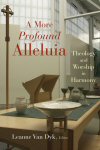
Two questions lie at the heart of this rich, suggestive book: What are the theological implications of worship? A what are the liturgical implications of theology? Convinced that worship and theology are integrally related, the authors of A More Profound Alleluia show in practical terms how liturgy and doctrine fruitfully illuminate each other.
Each chapter pairs an element of the worship service with related Christian teachings, clearly demonstrating how the great doctrines of the faith find their natural expression in the drama of worship and how the liturgy in turn finds its corollary in doctrine. The interrelation of theology and worship is illustrated with anecdotes from congregational life, resources drawn from church history, and themes from novels and films. Each chapter also includes two hymn texts that exemplify orthodox doctrine communicated through song.
A More Profound Alleluia will be a valuable text for courses in theology or worship, will help worship leaders to plan services with greater theological depth, and will enhance worship for Christian believers generally.
Christian congregations and their leaders need help in resisting the cultural forces that would cheapen or dumb down their worship. A More Profound Alleluia provides just this kind of help. By calling attention to the theological and ethical warp of corporate worship, this engaging book invites all Christians to love God with their minds every Sunday.
—Amy Plantinga Pauw, Henry P. Mobley Jr. Professor of Doctrinal Theology, Louisville Seminary
Leanne Van Dyk is dean and vice president of academic affairs and professor of Reformed theology at Western Theological Seminary in Holland, Michigan. She is also the author of The Desire of Divine Love and Believing in Jesus Christ.
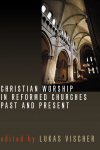
Worship renewal is now on the agenda of many Reformed churches, as the need for adaptation and new approaches is acutely felt all over. How can the church faithfully worship God in the midst of rapidly changing situations? How can it constructively relate to widely differing cultural contexts? What is its place in the wider ecumenical scene? In preparing a sweeping survey of Reformed worship across time and place, this volume provides some help to those engaged with vital questions like these.
Written by theologians and liturgical scholars from a wide range of churches and countries, these chapters explore the history of Reformed worship on every continent from the sixteenth century to the present. Surveying the most significant developments in the growth of Reformed worship, the book identifies the major “ingredients” that make the Reformed worship tradition distinctive and highlights those aspects of Reformed worship that are particularly relevant to present efforts at renewal. Indeed, an important component of this book is the inclusion of “A Common Reflection on Christian Worship in Reformed Churches Today,” the result of a major consultation in January 2001 at the International Reformed Center John Knox.
Revealing the rich variety of forms and diversity of perspectives that have made and do make up Reformed worship worldwide, this volume will be a valuable resource for church and worship leaders both in and outside the Reformed family.
Lukas Vischer (1926–2008) was a Swiss Reformed theologian noted for his ecumenical efforts in both the World Council of Churches and the World Alliance of Reformed Churches. He was professor emeritus of ecumenical theology at Evangelical Reformed Theological Faculty of Berne, Switzerland.
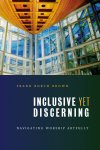
Worshiping communities today have access to more arts and styles from more times and places than ever before. In this volume Frank Burch Brown explores how Christians can navigate this increasingly diverse world of worship.
Brown combines an abiding admiration of classical idioms with an appreciation of new possibilities for the arts in worship. Interacting with a wide range of religious thinkers and leaders—from Augustine and John Calvin to Rick Warren, Marcus Borg, and the Pope—he addresses questions concerning “good” art and “good” music for worship.
A lively and thought-provoking book, Inclusive yet Discerning is permeated by Brown’s wide-ranging knowledge and deep love of the arts and his desire to articulate a theological aesthetic that, as he says, “will have teeth but not fangs.”
Frank Burch Brown has given us several writings on the complex interweaving of theology, the arts, and worship. Here, as before, he treats his themes with great patience, carefully probing each issue in turn. Inclusive yet Discerning will doubtless enrich a lively and important debate about how we handle the ever greater diversity of resources available to Christian worship today.
—Jeremy Begbie, author, Resounding Truth: Christian Wisdom in the World of Music
Brown takes us far further and deeper than his modest subtitle suggests. Drawing creatively yet critically on a wide range of material—from Calvin to Kierkegaard, from Bach to Pope Benedict XVI—he identifies ‘a potentially central role for aesthetic and artistic imagination within religious life as a whole, and within the Christian life specifically.’ Written with great clarity, high intelligence, and a refreshing open-mindedness, this powerful little book should do much to reactivate the aesthetic dimensions of Christian worship.
—Graham Howes, author, The Art of the Sacred
A number of the chapters speak of the need for a greater discernment regarding the use of the arts in worship, and the discussion of the relationship between culture and context is nuanced and insightful. In offering practical advice, the author steers a middle way between the mere performance of ‘high art,’ and the danger of an uncritical and wholesale adoption of ephemeral styles and artistic expression.
—Art & Christianity
The reader with some knowledge of the arts and aesthetics will find this book useful for reflection on how artful worship can assist and challenge a congregation in its encounter with the divine.
—Interpretation
Frank Burch Brown is Frederick Doyle Kershner Professor of Religion and the Arts at Christian Theological Seminary in Indianapolis, and the Alexander Campbell Visiting Professor of Religion and the Arts at the University of Chicago Divinity School. His previous books include the award-winning Good Taste, Bad Taste, and Christian Taste.
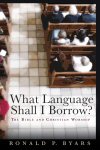
What language is most appropriate for worship? Should it lean toward the colloquial, perhaps targeting those attending a worship service for the first time? Or should it be a language with deeper roots, the language of a community that, for the most part, already loves the God to whom worship is offered?
Ronald Byars argues that the communal speech that truly honors God is, in fact, biblical language, which encompasses a vast range of forms—poetry and prose, song and proverb, parable and narrative. Byars explains how biblical language becomes liturgical language that pushes us beyond what we already think we know, requiring us to think anew about death and resurrection, beginnings and endings, and the life of faith. What Language Shall I Borrow? is an instructive, eloquent reminder not to retreat from biblical language and images but to fully embrace them in our worship today.
Christian worship soaked in the deep wells of Scripture can flow out to nourish believers in faith and life. Ron Byars’ book shows us how this is done and what difference it makes. This important contribution in the retrieval of Christian worship is also an indispensable encouragement for pastors and worship leaders and all who wish to understand the drama of worship embedded in the Bible.
—Leanne Van Dyk, professor of Reformed theology, Western Theological Seminary
What Language Shall I Borrow? reminds me of Paul Tillich’s insight that all faith language is symbolic: until we discover the affirmations of faith that lie behind specific words, we miss much of the power of language. In other words, the language of worship is always ‘borrowed language.’ Ron Byars’ careful work with the language of the Presbyterian Book of Common Worship takes readers behind the actual words used in worship into the gospel affirmations of those words. His book will be a valuable resource to students and leaders of worship who seek to build bridges between ancient words that communicate faith and the ever-present contemporary yearning to be grasped by those words.
—Art Ross, pastor, White Memorial Presbyterian Church, Raleigh, North Carolina, and author, Romans
Ronald P. Byars is professor emeritus of preaching and worship at Union Theological Seminary and Presbyterian School of Christian Education in Richmond, Virginia. His previous books include Lift Your Hearts on High and The Future of Protestant Worship.
This title is included in the following collections
You can save when you purchase this product as part of a collection.
Bible Reference Bundle 2.0
$4,512.95$3,599.99Logos 8 Collector's Edition Le...
$11,399.99$11,399.99Logos 8 Ultimate Legacy Librar...
$21,749.99$21,749.99Eerdmans Ultimate Collection (...
$37,403.33$27,999.99